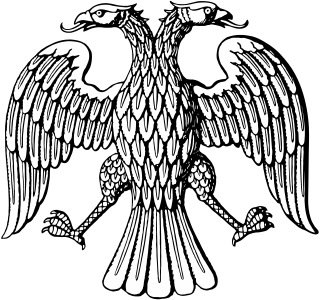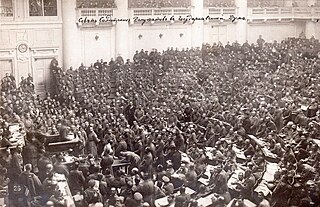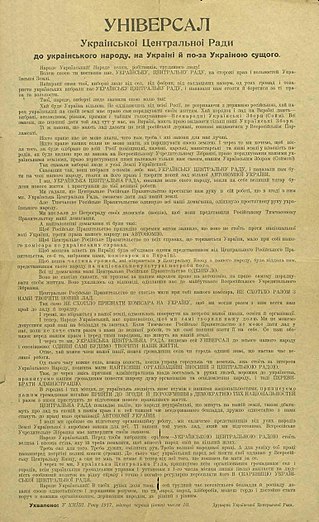Related Research Articles
A duma is a Russian assembly with advisory or legislative functions.

The Directorate, or Directory was a provisional collegiate revolutionary state committee of the Ukrainian People's Republic, initially formed on 13–14 November 1918 during a session of the Ukrainian National Union in rebellion against the Ukrainian State. During the Anti-Hetman Uprising it was named as the Executive Council of the State Affairs. Its authority was extended by the Labor Congress of Ukraine on 23–28 January 1919.

Valuyki is a town in Belgorod Oblast, Russia, located at the confluence of the Valuy and Oskol Rivers, 150 kilometers (93 mi) east of Belgorod and 15 km north of the Russia–Ukraine border. Population: 33,032 (2021 Census); 35,322 (2010 Census); 35,790 (2002 Census); 34,863 (1989 Soviet census).

The State Duma, also known as the Imperial Duma, was the lower house of the legislature in the Russian Empire, while the upper house was the State Council. It held its meetings in the Tauride Palace in Saint Petersburg. It convened four times between 27 April 1906 and the collapse of the empire in February 1917. The first and the second dumas were more democratic and represented a greater number of national types than their successors. The third duma was dominated by gentry, landowners, and businessmen. The fourth duma held five sessions; it existed until 2 March 1917, and was formally dissolved on 6 October 1917.

Tallinn City Council is the representative body of the municipality of Tallinn, the capital and biggest city of Estonia.

The Russian Provisional Government was a provisional government of the Russian Empire and Russian Republic, announced two days before and established immediately after the abdication of Nicholas II on 2 March, O.S. [15 March 1917, N.S.], during the February Revolution. The intention of the provisional government was the organization of elections to the Russian Constituent Assembly and its convention. The provisional government, led first by Prince Georgy Lvov and then by Alexander Kerensky, lasted approximately eight months, and ceased to exist when the Bolsheviks gained power in the October Revolution in October [November, N.S.] 1917.

The All Russian Constituent Assembly was a constituent assembly convened in Russia after the February Revolution of 1917. It met for 13 hours, from 4 p.m. to 5 a.m., 18–19 January [O.S. 5–6 January] 1918, whereupon it was dissolved by the Bolshevik-led All-Russian Central Executive Committee, proclaiming the Third All-Russian Congress of Soviets the new governing body of Russia.

The Moscow Bolshevik Uprising was the armed uprising of the Bolsheviks in Moscow, from 25 October to 2 (15) November 1917 during the October Revolution of Russia. It was in Moscow in October where the most prolonged and bitter fighting unfolded. Some historians consider the fighting in Moscow as the beginning of the Russian Civil War.

The Petrograd Soviet of Workers' and Soldiers' Deputies was a city council of Petrograd, the capital of Russia at the time. For brevity, it is usually called the Petrograd Soviet.

The system of administrative division of Ukraine in 1918 was inherited from the Russian Empire, and was based on the governorate division with the smaller subdivisions district (povit) and rural district (volost). A new administrative reform was adopted by the Central Council of Ukraine on March 6, 1918 which saw restructuring the subdivision of Ukraine based on a new system of regions (zemlias) and abolishing the system of governorates and povits. The zemlias were divided into volosts, which were further divided into hromadas. Implementation of the new system was never fully realized and after the Skoropadsky's coup-d'état on April 29, 1918 was abandoned.

The Sakhalin Oblast Duma is the regional parliament of Sakhalin Oblast, a federal subject of Russia. Together with the executive and judicial branches, the oblast's legislative assembly is vested with power to control the oblast's own affairs with moderate levels of autonomy from Moscow. A total of 28 deputies are elected for five-year terms. 18 deputies are elected by single-member constituencies and 10 deputies are elected in party lists.

New People is a political party in Russia formed in 2020. New People is considered a liberal party, and observers also often refer to it as centrist or centre-right.

The First Universal of the Ukrainian Central Council is a state-political act, the universal of the Central Council of Ukraine, which proclaimed the autonomy of Ukraine. Accepted 23 June [O.S. 10 June] 1917 in Kyiv. The full name is the Universal of the Ukrainian Central Rada to the Ukrainian people, in Ukraine and beyond Ukraine.

The Second Universal of the Ukrainian Central Council is a state-political act, universal of the Central Council of Ukraine, which fixed the agreements between the Ukrainian Central Rada and the Provisional Government of Russian Republic. Proclaimed by Volodymyr Vynnychenko 16 July [O.S. 3 July] 1917 in Kyiv, at a solemn meeting at the Pedagogical Museum in response to a telegram from the Provisional Government to the Central Rada.

An election to the Kiev City Duma was held on 5 August [O.S. 23 July] 1917. The election took place in the aftermath of the February Revolution, the formation of the Ukrainian Central Rada and the First World War. The election resulted in a victory for the socialist bloc.

An election to the Baku City Duma was held on 11 November [O.S. 29 October] 1917. Baku was the last major city in Russia to hold local duma elections during 1917. Notably, the vote was held after October Revolution commenced.
An election to the city duma of Ekaterinburg was held on November 5, 1917. The election was part of the series of municipal elections across Russia following the February Revolution. A Ekaterinburg city duma election had been held on July 30, 1917, but in November a second election was held.
An election to the Minsk City Duma was held on 30 July 1917. A total of 102 deputies were elected in Minsk. Some 105,000 civilians and 24,000 soldiers were eligible to vote. The election was preceded by an active election campaign, with campaign rallies, campaigns vehicles crossing through the city and buildings covered by posters for the different candidate lists. The voting occurred in orderly fashion, with voters queuing for hours from the early morning. The socialist parties formed a majority coalition after the election, with the Bundist Arn Vaynshteyn becoming the new city duma chairman.
An election to the Odessa City Duma was held on August 19 [O.S. August 6] 1917. The election was part of a series of municipal elections across Russia that took place between the February and October revolutions of 1917. The Socialist-Revolutionary Party won a landslide victory in Odessa. The Odessa City Duma continued to play an important role until the end of 1917.
Elections to Moscow District Dumas were held on October 7 [O.S. September 24] 1917. It was the second of the three general elections in Moscow in 1917, between the City Duma election of June 1917 and the All-Russian Constituent Assembly election in November 1917. The Bolshevik Party won a landslide victory, obtaining an absolute majority in 11 out of 17 districts and a plurality in another 3 districts. The Kadet Party finished in second place, able to retain most of their support base from the June 1917 Moscow City Duma election whilst the support for the moderate socialists who had won the June 1917 election collapsed. The electoral participation was low.
References
- 1 2 3 4 5 В. А. Бондар. ДІЯЛЬНІСТЬ ОДЕСЬКОЇ МІСЬКОЇ ДУМИ У БЕРЕЗНІ – СЕРПНІ 1917 р. (ЗА МАТЕРІАЛАМИ ГАЗЕТИ «ОДЕССКИЙ ЛИСТОК»)
- ↑ Дружкова І. С. Одеська міська Дума 1917 р.: вибори та склад / І. С. Дружкова // Інтелігенція і влада. Серія : Історія. - 2004. - Вип. 3. - С. 23-35